AI Research Engineers play a significant role in pushing the boundaries of artificial intelligence. They work on developing and refining algorithms that drive advancements in AI technology, blending mathematics, computer science, and domain knowledge to create innovative solutions.
The skills required for an AI Research Engineer include proficiency in programming languages like Python, understanding of machine learning frameworks, and knowledge of data structures and algorithms. They also need analytical thinking and the ability to collaborate effectively with interdisciplinary teams.
Candidates can write these abilities in their resumes, but you can’t verify them without on-the-job AI Research Engineer skill tests.
In this post, we will explore 8 essential AI Research Engineer skills, 8 secondary skills and how to assess them so you can make informed hiring decisions.
Table of contents
8 fundamental AI Research Engineer skills and traits
The best skills for AI Research Engineers include Machine Learning, Programming Languages, Data Analysis, Mathematics, Deep Learning, AI Frameworks, Natural Language Processing and Computer Vision.
Let’s dive into the details by examining the 8 essential skills of a AI Research Engineer.
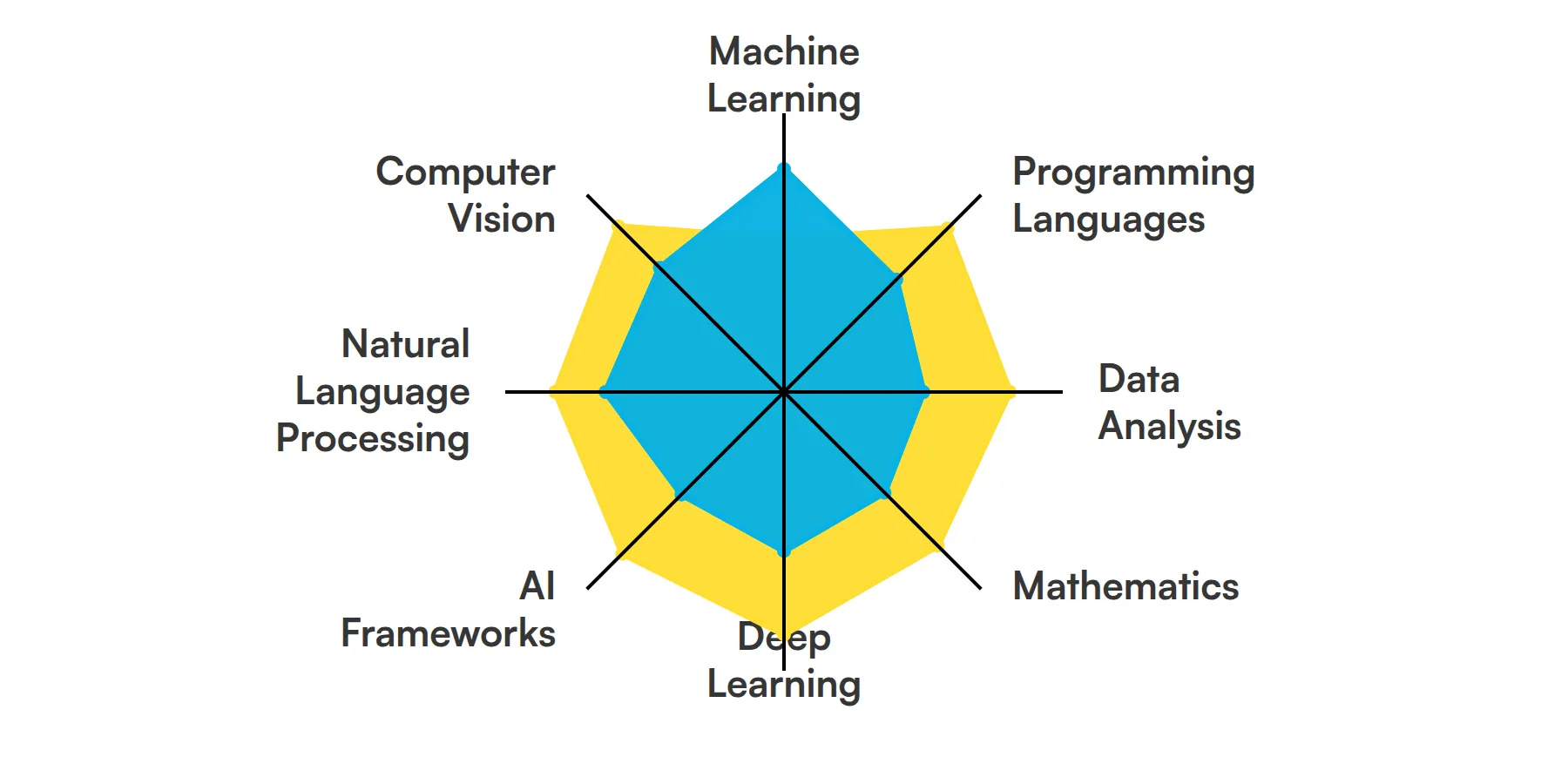
Machine Learning
Machine Learning is key for AI Research Engineers, allowing them to design algorithms that improve from data patterns. These algorithms form the backbone of most AI systems, helping to create predictive models and automate decision-making processes.
For more insights, check out our guide to writing a Machine Learning Engineer Job Description.
Programming Languages
Proficiency in languages such as Python and C++ is necessary for implementing AI algorithms. AI Research Engineers need strong coding skills to develop and test AI models efficiently, seamlessly connecting theory with practical application.
Data Analysis
Data Analysis skills enable AI Research Engineers to extract meaningful insights from vast datasets. This involves cleaning, processing, and interpreting data to improve models and ensure they are based on accurate, relevant information.
Check out our guide for a comprehensive list of interview questions.
Mathematics
A solid understanding of mathematics, especially linear algebra, calculus, and statistics, helps AI Research Engineers design complex algorithms. These mathematical foundations are critical for understanding AI model structures and functions.
Deep Learning
Deep Learning involves working with neural networks to simulate human-like learning capabilities. AI Research Engineers use this to tackle complex tasks such as natural language processing, image recognition, and advanced robotics.
AI Frameworks
Familiarity with AI frameworks like TensorFlow and PyTorch allows AI Research Engineers to build and optimize models efficiently. These frameworks provide pre-built components, accelerating the development process.
Natural Language Processing
Natural Language Processing (NLP) enables the building of systems that comprehend and converse in human language. AI Research Engineers leverage NLP for applications like chatbots, translators, and voice assistants.
For more insights, check out our guide to writing a Natural Language Processing Engineer Job Description.
Computer Vision
Computer Vision skills are crucial for developing systems that can interpret visual data. AI Research Engineers use these skills to build models capable of tasks such as facial recognition and autonomous driving.
8 secondary AI Research Engineer skills and traits
The best skills for AI Research Engineers include Cloud Platforms, Version Control, Data Visualization, Cybersecurity, Time Management, Distributed Systems, Algorithm Optimization and Scripting.
Let’s dive into the details by examining the 8 secondary skills of a AI Research Engineer.
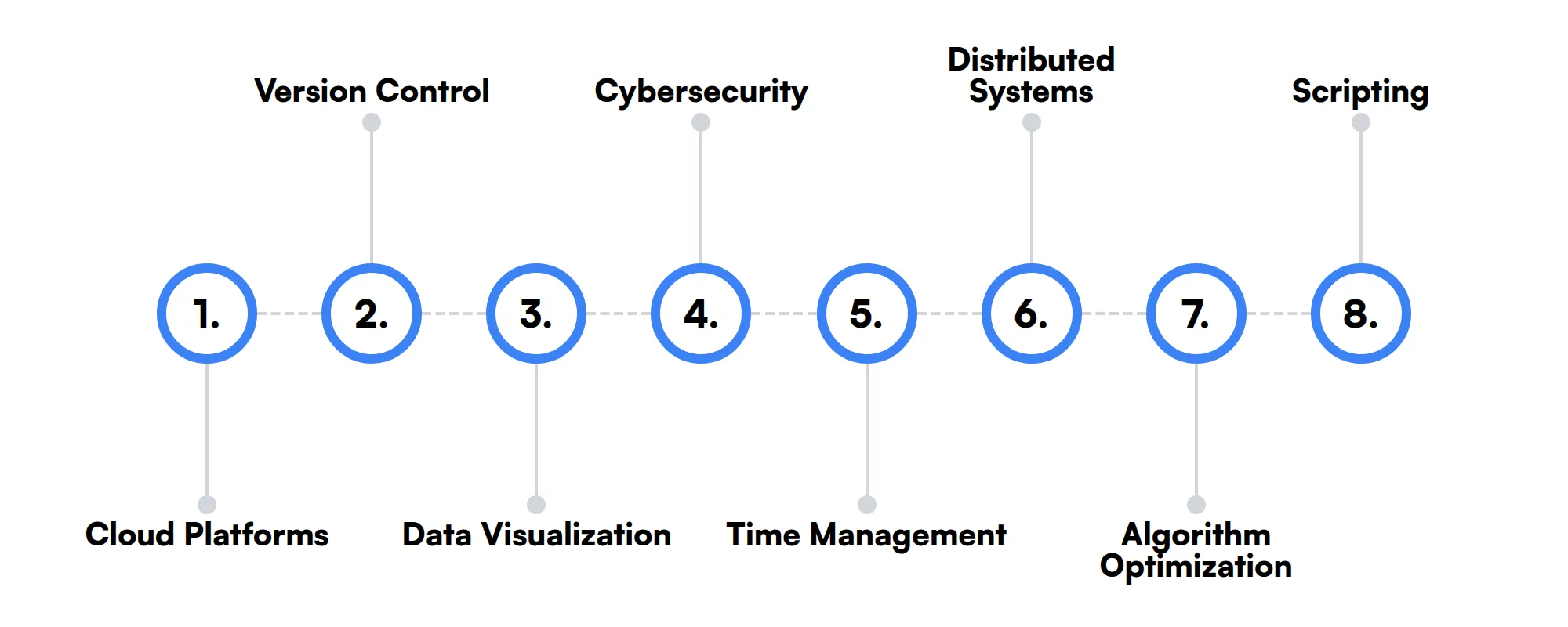
Cloud Platforms
Understanding cloud platforms like AWS or Azure is beneficial for deploying AI models at scale. This knowledge helps AI Research Engineers ensure their solutions are robust and scalable.
Version Control
Proficiency with version control systems like Git aids in collaborative coding and managing project evolution. It’s crucial for maintaining code integrity and enabling backtracking.
Data Visualization
Ability to visualize data patterns and insights helps AI Research Engineers present complex results in an accessible manner. This is important for stakeholder communications and decision-making.
Cybersecurity
Knowledge of cybersecurity practices is essential in safeguarding AI models and data. AI Research Engineers must ensure their systems are protected against vulnerabilities and attacks.
Time Management
Effective time management allows AI Research Engineers to juggle multiple projects and deadlines. Proper scheduling and prioritization can significantly enhance productivity and project outcome.
Distributed Systems
Understanding distributed systems is beneficial for developing AI models that operate efficiently across multiple machines. This is crucial for processing large datasets in parallel and optimizing resource use.
Algorithm Optimization
Skills in algorithm optimization enable AI Research Engineers to improve model performance and efficiency. This ensures that solutions run faster and consume fewer resources.
Scripting
Scripting, particularly with shell scripts, automates repetitive tasks, speeding up the development process. AI Research Engineers use scripting to streamline data preprocessing and model training.
How to assess AI Research Engineer skills and traits
Assessing the skills and traits of an AI Research Engineer is no straightforward feat. With a diverse array of competencies spanning from machine learning to computer vision, getting a clear picture of a candidate's strengths requires more than just glancing at a resume. This is where skills-based assessments play a key role in identifying true proficiency and alignment with the role you are hiring for.
Traditional evaluation methods might miss the nuanced depth AI Research Engineers possess in skills like natural language processing or deep learning. To ensure that you are bringing the right talent on board, it's important to utilize targeted assessments that reflect the specific skills your project demands. Adaface assessments offer a 2x improved quality of hires, providing you the insight needed to make informed decisions and reducing your screening time by 85%.
Let’s look at how to assess AI Research Engineer skills with these 6 talent assessments.
Machine Learning in AWS Online Test
Machine Learning in AWS Online Test evaluates a candidate's skills in machine learning within the AWS environment. This test covers key capabilities, including data science and data analysis skills, which are important for constructing and deploying machine learning models on AWS.
The test delves into the candidate's understanding of data science, data analysis, and the application of machine learning techniques using AWS services. It examines their proficiency with programming languages like Python and its libraries, and the ability to develop and deploy machine learning solutions using Kubernetes and AWS DevOps.
Candidates scoring highly in this test demonstrate strong knowledge of AWS machine learning services and the ability to integrate them for end-to-end ML solutions. They show they can effectively handle data operations and apply machine learning principles in real-world scenarios.
C Online Test
The C Online Test evaluates a candidate's expertise in C programming, focusing on their ability to apply fundamental programming concepts. It is designed to test their understanding of using data types, operators, control structures, and other core features of the C language.
Candidates must demonstrate proficiency in pointers, arrays, control structures, functions, and file handling through a variety of MCQs and coding questions. The test also assesses dynamic memory allocation and more advanced aspects of C programming, such as preprocessor directives.
Successful candidates show a comprehensive understanding of C programming fundamentals and advanced concepts. They can manage complex data structures and implement solutions requiring efficient memory utilization.
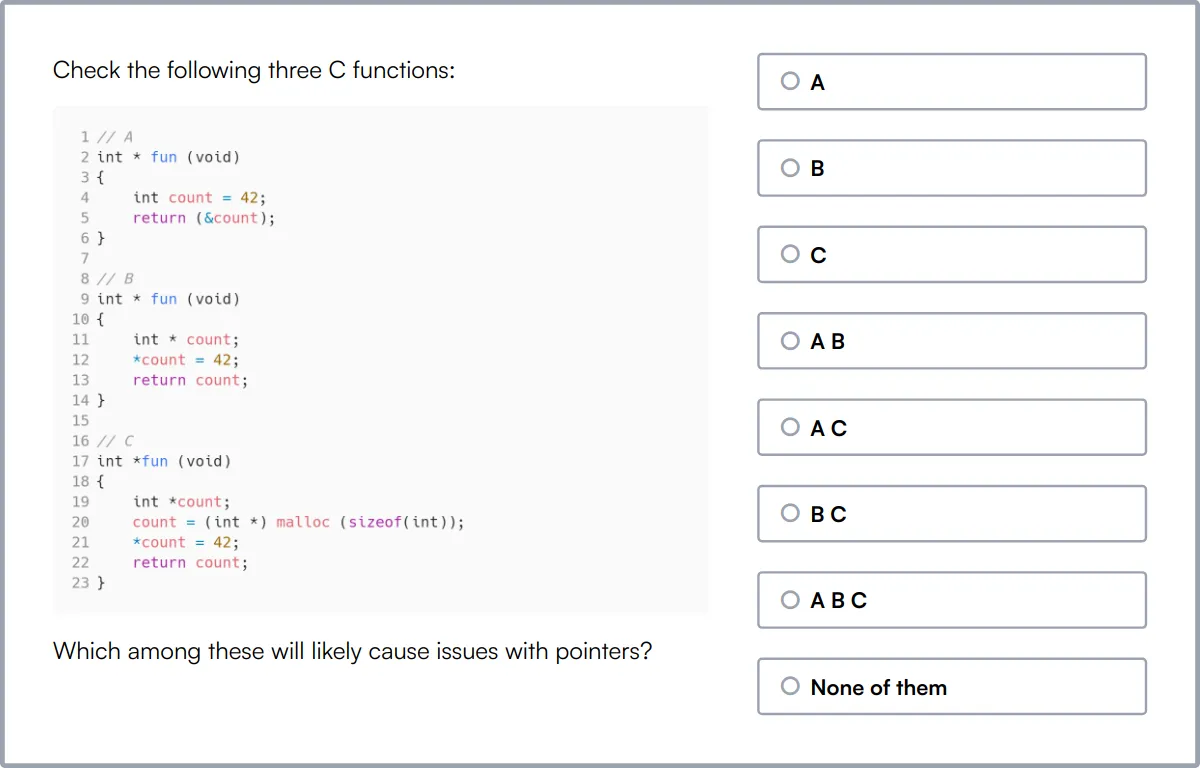
Data Analysis Test
Our Data Analysis Test measures a candidate's skills in data analysis, encompassing data handling, modification, and interpretation. It targets their ability to derive insights from data and apply foundational business analysis skills.
The evaluation checks their competency in data modeling, data interpretation with charts and graphs, and SQL for data querying. Through scenario-based questions, candidates showcase their capacity to identify patterns, detect anomalies, and make data-driven projections.
Candidates who excel in this test possess excellent analytical competencies, capable of articulating insights from data patterns and trends, and proficiently using tools like Excel to perform data operations.

Deep Learning Online Test
The Deep Learning Online Test examines a candidate's grasp of deep learning principles, from neural network architectures to practical applications in fields like computer vision and natural language processing.
It challenges candidates with questions on activation functions, backpropagation, CNNs and RNNs. Additionally, it assesses their capability to implement solutions for computer vision and text classification using various deep learning models.
High scores indicate proficiency in applying deep learning techniques to solve complex problems, demonstrating expertise in concepts like transfer learning and optimization algorithms.
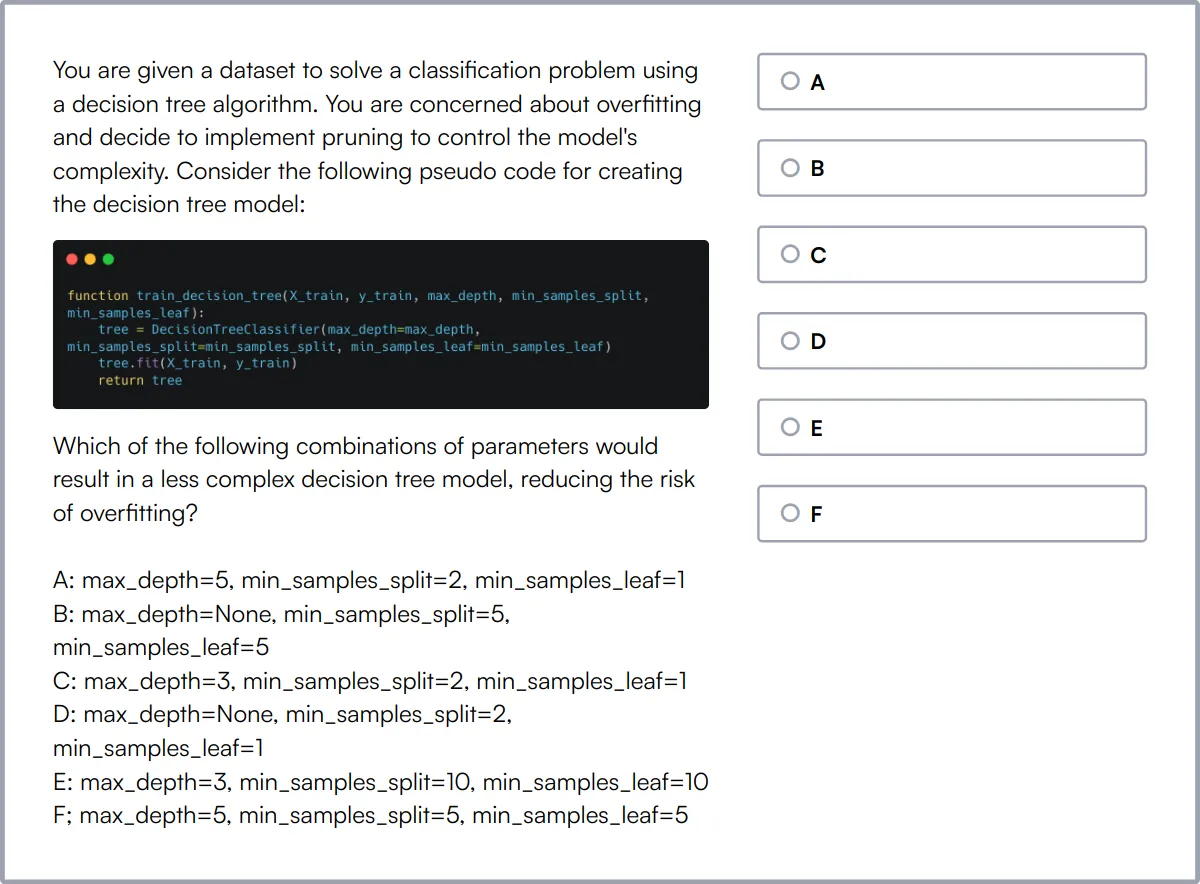
TensorFlow Test
The TensorFlow Test evaluates candidates on their practical skills in using TensorFlow for machine and deep learning tasks. It places emphasis on building and deploying models using TensorFlow's rich set of APIs.
Candidates must showcase proficiency in model training and evaluation, neural network architecture, and the integration of TensorFlow Keras API. The test includes challenges associated with CNNs, RNNs, and transfer learning.
Top-performing candidates illustrate their ability to implement, train, and tune machine learning models with TensorFlow. They can navigate TensorFlow's ecosystem, employing modes like TensorFlow Serving for robust deployment solutions.
Natural Language Processing (NLP) Test
The Natural Language Processing (NLP) Test evaluates skills in NLP concepts such as text classification and sentiment analysis. It focuses on the candidate’s capability to apply these techniques to real-world scenarios.
It examines understanding of processes like tokenization, named entity recognition, language modeling, and machine translation. The test also covers various NLP tasks that require extracting and organizing semantic information from text data.
Candidates who excel in this test can effectively deploy NLP models for tasks such as text summarization and topic modeling, demonstrating proficiency in extracting insights from large text datasets.
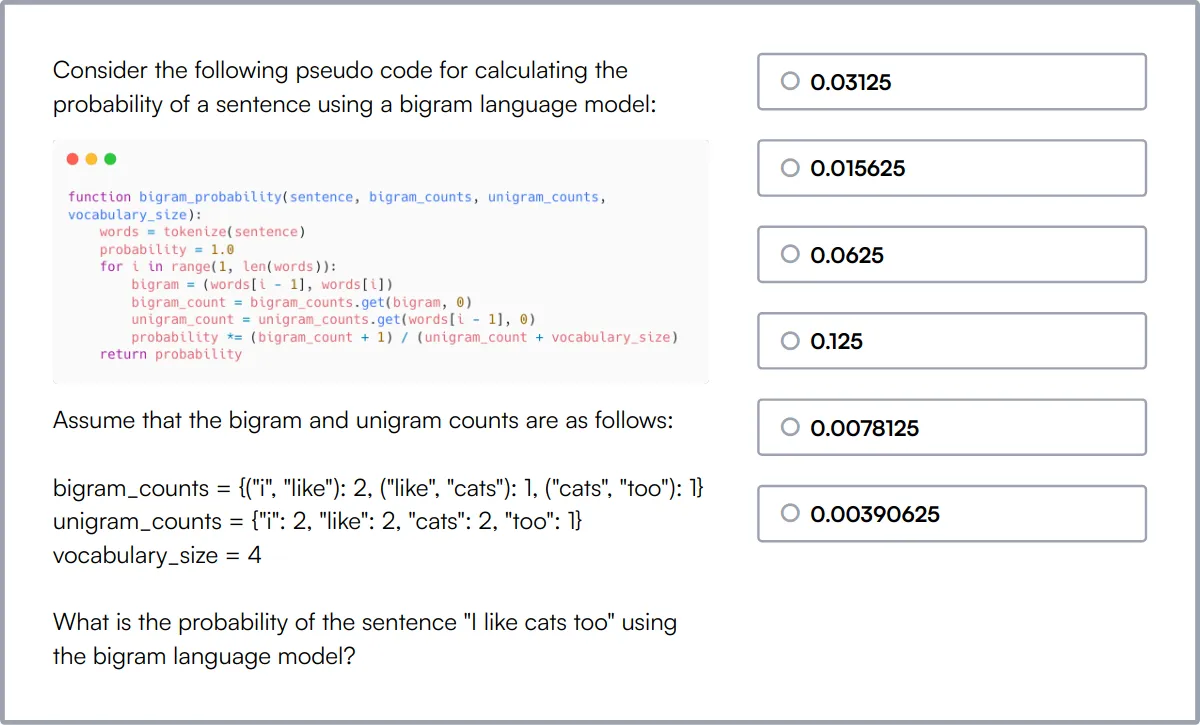
Summary: The 8 key AI Research Engineer skills and how to test for them
| AI Research Engineer skill | How to assess them |
|---|---|
| 1. Machine Learning | Evaluate the ability to design and improve predictive models. |
| 2. Programming Languages | Assess proficiency in writing and debugging code. |
| 3. Data Analysis | Test skills in interpreting complex datasets to extract insights. |
| 4. Mathematics | Check knowledge of algorithms, statistics, and numerical methods. |
| 5. Deep Learning | Examine the capability to develop and train neural networks. |
| 6. AI Frameworks | Evaluate experience with using frameworks like TensorFlow or PyTorch. |
| 7. Natural Language Processing | Assess skills in interpreting and processing human language data. |
| 8. Computer Vision | Gauge the ability to implement image and video processing techniques. |
AI Research Engineer Test
AI Research Engineer skills FAQs
What programming languages should an AI Research Engineer be proficient in?
AI Research Engineers should know languages like Python, R, and C++. Python is widely used due to its vast libraries for AI, while R is great for statistical analysis. C++ may be needed for performance-critical applications.
How important is mathematics in AI Research Engineering?
Mathematics underpins many AI concepts. Engineers should understand linear algebra, calculus, probability, and statistics to develop and optimize AI models effectively.
What is the role of deep learning in AI research?
Deep learning is key to advancements in fields like image and speech recognition. Understanding neural networks and frameworks like TensorFlow or PyTorch is essential for AI research.
How can a recruiter assess a candidate's knowledge of AI frameworks?
Ask candidates to discuss their experience with frameworks like TensorFlow, PyTorch, or Keras. Look for examples of projects they've completed using these tools.
Why is cloud platform expertise important for AI engineers?
AI projects often require scalable resources. Knowledge of cloud platforms like AWS or Azure enables engineers to deploy and manage AI models efficiently.
What is the significance of version control systems in AI research?
Version control systems like Git help manage code changes and collaborate with team members. They are crucial for maintaining code integrity in research projects.
How relevant is data visualization in the role of an AI Research Engineer?
Data visualization helps interpret and communicate complex data insights. Skills in tools like Matplotlib or Tableau are beneficial for presenting findings effectively.
What should a candidate know about distributed systems for AI roles?
Understanding distributed systems aids in processing large datasets and training models on multiple nodes, which is useful for scaling AI solutions.

40 min skill tests.
No trick questions.
Accurate shortlisting.
We make it easy for you to find the best candidates in your pipeline with a 40 min skills test.
Try for freeRelated posts
Free resources



